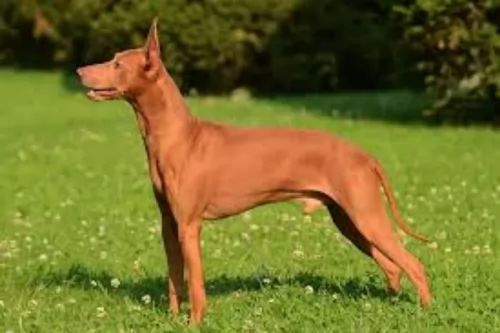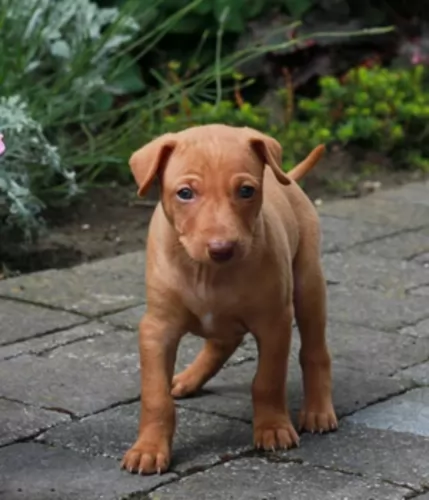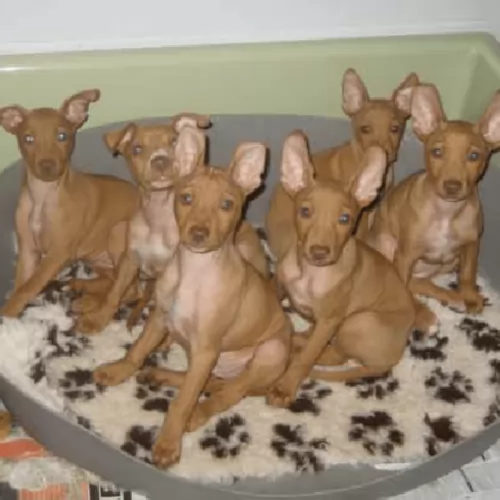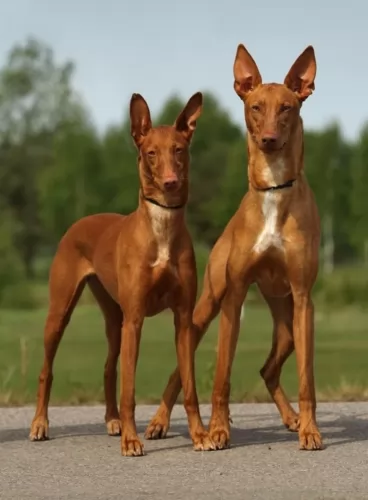 Petzlover
PetzloverCirneco dell'Etna is originated from Italy but Russian Setter is originated from Russia. Cirneco dell'Etna may grow 16 cm / 6 inches shorter than Russian Setter. Cirneco dell'Etna may weigh 20 kg / 44 pounds lesser than Russian Setter. Both Cirneco dell'Etna and Russian Setter has almost same life span. Both Cirneco dell'Etna and Russian Setter has almost same litter size. Both Cirneco dell'Etna and Russian Setter requires Moderate Maintenance.
 The Cirneco dell’Etna comes from the island of Sicily and not mainland Italy, although it is considered an Italian dog. It is a small dog that hunted rabbits and its calling card was its ability to go for hours without water or food. They have terrific endurance and a good sense of smell. They were developed for the harsh terrain they worked around places like Mount Etna. Of all the Mediterranean island hunting dogs, the Cirneco de’Etna is the smallest.
The Cirneco dell’Etna comes from the island of Sicily and not mainland Italy, although it is considered an Italian dog. It is a small dog that hunted rabbits and its calling card was its ability to go for hours without water or food. They have terrific endurance and a good sense of smell. They were developed for the harsh terrain they worked around places like Mount Etna. Of all the Mediterranean island hunting dogs, the Cirneco de’Etna is the smallest.
This is a very ancient breed, surviving on its hunting skills alone for thousands of years on Sicily. They then became guard dogs for the peasants. Because they had such speed, sense of smell, alertness and sight, they were great hunters.
Today’s Cirneco de’Etna is highly competitive in confirmation and make terrific pets. They are exceedingly friendly, energetic and low maintenance. Lure coursing is what they really excel at. They are good at agility and pursuit games as well.
People often think it is ridiculous that a Setter dog comes from Russia. It is believed that the Russians did have some kind of Griffon and the word Pointer is also often translated as Setter.
It is believed that the Russian Setter is one of the ancestors of the Wire-haired Pointing Griffon and that it possibly shared an ancestry with the German wire-haired and broken-haired pointers.
References to Russian Setters were fairly common in the 19th century, but there is such contradictory information that it is hard to get good information on the dogs. The Russian Setter is believed to have existed before the Russian Revolution resembling the English Setter. Dog experts tell us the dog no longer exists.
 The Cirneco de’Etna is a sleek, muscular sighthound. His ears are close together and high on his head. The head is lean, and the skull is almost flat in profile. The muzzle is about the same length as the skull and the nose is large and its coloring matches the dog’s coat. They have hard pads the same color as their nails, but they are never black.
The Cirneco de’Etna is a sleek, muscular sighthound. His ears are close together and high on his head. The head is lean, and the skull is almost flat in profile. The muzzle is about the same length as the skull and the nose is large and its coloring matches the dog’s coat. They have hard pads the same color as their nails, but they are never black.
In terms of appearance, it was John Henry Walsh who said that the Russian Setter was a dog hidden by its long, woolly matted coat.It seems to have been a medium sized dog with an elegant appearance. It seems the dog came in two varieties - the curly coated liver coated dogs and the fawn colored dogs which are straight coated.
Because there is very little information on these dogs, we assume they were between 57 – 68cm in height and between 27 and 32kg in weight. The coat was no doubt in colours such as grey, reddish-brown with some black and white and shortish and wiry. The ears were floppy,and the face no doubt had some longer hair around the muzzle.
Nobody seems to know exactly what the temperament of this dog was, but when you look at some of his ancestors you can assume that he was strong-willed, confident and a skilled hunter.
He would have required a lot of exercise too. He was lively and energetic. Because he had Pointer in him you can be sure that he would have been intelligent so that he could be trained and socialized.
He would have been keen to learn with an owner who was firm and consistent in his treatment of him. He is a dog most happiest when he can spend time with his human family, a most loyal and devoted family friend, capable of getting on well with children and pets in the home.
It appears, according to records that the Russian Setter has come and gone. However he would have been a calm, gentle pet with running ad hunting keeping him happy. He would therefore have required a lot of exercise.
We can assume that according to the few records that there are, that this was an affable, pleasing dog breed which made a great family pet.
 Like many dogs that come from ancient breeds with little cross breeding over the years, there are not a lot of inherited issues for the Cirneco de’Etna. Also, there are so few dogs remaining that little is known about their health in general and there are no studies to go on. Some breeders will do test despite the fact that none are recommended.
Like many dogs that come from ancient breeds with little cross breeding over the years, there are not a lot of inherited issues for the Cirneco de’Etna. Also, there are so few dogs remaining that little is known about their health in general and there are no studies to go on. Some breeders will do test despite the fact that none are recommended.
Their most common health issues are acquired such as injuries from running or competitions and obesity. Both can be controlled by the owner.
The Russian Setter had an average lifespan of 10 – 14 which is a fairly good innings for a dog. Nonetheless you would have had to be aware of some common dog problem. These dogs were prone to major health issues such as both hip and elbow dysplasia, deafness, epilepsy and hypothyroidism.
The thyroid glands produce hormones that affect the function of many parts of the body. Dogs with this illness have a low production of thyroid hormones.
This disease is mainly caused by inflammation or shrinkage of the thyroid gland. The most common signs of low thyroid in dogs is thinning of the fur, the coat is dull, there is weight gain and excess shedding. The dog doesn’t tolerate cold well either. These dogs also often have ear infections.
 The Cirneco needs a good quality food since they are such high energy dogs. Be careful not to overfeed them so that they become obese.
The Cirneco needs a good quality food since they are such high energy dogs. Be careful not to overfeed them so that they become obese.
As previously mentioned, the main concern for owners is injuries acquired while on a running course or in the activities of daily living. They have been known to hurt their feet. They need their ears checked regularly for any signs of infection or irritation. Clean out any excess water or dirt.
This is an intelligent, hardy breed that needs mental and physical stimulation. They need a job, or they can be a major problem. They love hunting of course but also excel at agility, lure crossing, and competition. He is loyal and loves being with people. Take him for long walks but don’t let him off the leash.
Whatever kind of coat the Russian Setter ad it would have required a brushing twice a week to keep it in top form.
The medium length floppy ears would have to be checked inside for ear infection.
His owners would have checked inside the mouth for any signs of rotten or bad teeth.
His nails would have required trimming.
Dogs need the best food there is to stay healthy. The Russian Terrier, if it were still around today, would have had the best commercially manufactured food there was.
You want to provide dogs with some good homemade food too. Dogs thrive on simplicity and consistency to avoid upsetting the stomach. Some home-cooked food such as boiled chicken, sweet potatoes, brown rice or pasta, carrots and spinach would be perfect for him. Chop the food up finely and add it into the dry kibble once or twice a week. Raw meat should also be added in when possible to promote good skin health.
Make sure your pet is never without a constant supply of fresh, cool water.